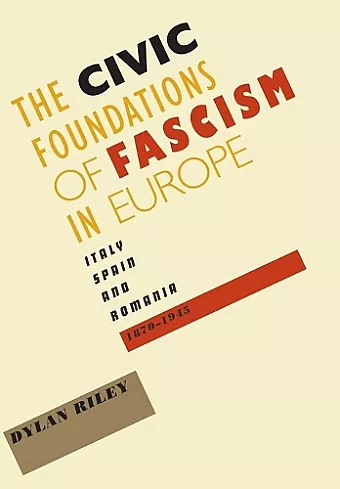The Civic Foundations of Fascism in Europe
Italy, Spain, and Romania, 1870–1945
Format:Hardback
Publisher:Johns Hopkins University Press
Published:6th Apr '10
Currently unavailable, and unfortunately no date known when it will be back

This brilliant comparative study of the rise of fascism in Italy, Spain, and Romania brings Tocqueville and Gramsci into a novel and surprising conversation. It will change the way you think about civil society, fascism, and democracy. -- William Sewell, the University of Chicago Make no mistake, this is much more than comparative fascisms. Dylan Riley not only rethinks and meshes the legacies of Tocqueville, Arendt and Gramsci; he sobers us up to the actual history of civil society and democratization in continental Europe. This theoretical lesson seems still gravely relevant elsewhere in the world today. -- Georgi Derluguian, author of Bourdieu's Secret Admirer in the Caucasus: A World-Systems Biography
Scholars and students interested in debates about the rise of fascism and authoritarianism, democratization, civil society, and comparative and historical methods will find his arguments compelling and his conclusions challenging.Dylan Riley reconceptualizes the nature and origins of interwar fascism in this remarkable investigation of the connection between civil society and authoritarianism. From the late nineteenth century to World War I, voluntary associations exploded across Europe, especially among rural non-elites. But the development of this "civil society" did not produce liberal democracy in Italy, Spain, and Romania. Instead, Riley finds that it undermined the nascent liberal regimes in these countries and was a central cause of the rise of fascism. Developing an original synthesis of Gramsci and Tocqueville, Riley explains this surprising outcome by arguing that the development of political organizations in the three nations failed to keep pace with the proliferation of voluntary associations, leading to a crisis of political representation to which fascism developed as a response. His argument shows how different forms of fascism in Italy, Spain, and Romania arose in response to the divergent paths taken by civil society development in each nation. Presenting the seemingly paradoxical argument that the rapid development of civil society facilitated the rise of fascism in Italy, Spain, and Romania, Riley credibly challenges the notion that a strong civil society necessarily leads to the development of liberal democracy. Scholars and students interested in debates about the rise of fascism and authoritarianism, democratization, civil society, and comparative and historical methods will find his arguments compelling and his conclusions challenging.
Recommended. Choice 2011 Riley's account of the civic foundations of fascism succeeds not only in throwing new light on old questions, but also in redefining the theoretical parameters for understanding fascism. It will change the way we think about fascism in the future. -- Max Whyte American Journal of Sociology 2010
ISBN: 9780801894275
Dimensions: 229mm x 152mm x 23mm
Weight: 499g
280 pages